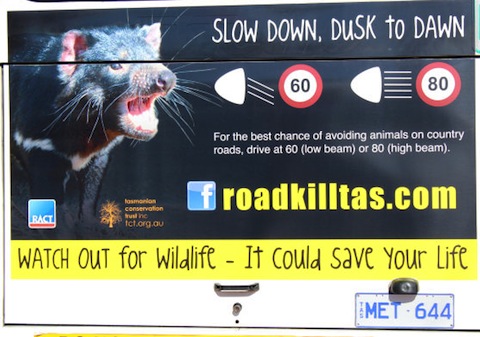 Fact-checking Tasmania’s claim to be the roadkill capital of the world is no easy feat, since few of its potential competitors (we’re looking at you, Madagascar) keep accurate statistics regarding flattened wildlife. One thing that is certain, however, is that the remote Australian state is a tireless innovator in the roadkill space, dedicating vast resources to mapping trouble spots and figuring out how best to care for victims. Not content to rest on their laurels, however, the Tasmanian authorities are now nudging the ball along even further, by advocating a plan to turn roadkill into compost:
Fact-checking Tasmania’s claim to be the roadkill capital of the world is no easy feat, since few of its potential competitors (we’re looking at you, Madagascar) keep accurate statistics regarding flattened wildlife. One thing that is certain, however, is that the remote Australian state is a tireless innovator in the roadkill space, dedicating vast resources to mapping trouble spots and figuring out how best to care for victims. Not content to rest on their laurels, however, the Tasmanian authorities are now nudging the ball along even further, by advocating a plan to turn roadkill into compost:
On farm, or just within gardens. I mean, look, people recycle sheep droppings. You regularly see people selling sheep poo on the side of the road. In our local area, those sort of things don’t last long. People are very quick to buy them. So I do think that there’s a market for recycled roadkill, potentially, in Tasmania.
But is this the most efficient use of roadkill? An argument could be made that the poor wallabies, possums, and bandicoots who meet their Maker on Tasmania’s roads might be more valuable as a direct source of calories for humans, rather than a nutrient for future vegetables. The trick, of course, would be to figure out a way to counteract an old taboo against eating meat that was once stuck to asphalt. An enterprising advertising firm should take up that grand challenge.


Jordan // Oct 8, 2013 at 11:20 am
West Virginia might have a thing or two to teach them on that front:
http://pccocwv.com/roadkill_cookoff_and_festival.html
Brendan I. Koerner // Oct 8, 2013 at 11:57 am
@Jordan: One of my very first journalism assignments was to cover the debate over the bill that made roadkill consumption legal in West Virginia. There was a lot of concern that people would contract Creutzfeldt–Jakob disease from eating squirrel brains.
Jordan // Oct 9, 2013 at 6:15 pm
Definitely a risk with roadkill. My friend who is an enthusiastic eater of just about every part of animals imaginable draws the line at anything to do with the central nervous system for that reason.
Elk are probably the bigger concern, since the prions that cause Chronic Wasting Disease can be transmitted to humans. A student in my microbiology course when I was in college used to work at the Mayo Clinic and noted that they had seen a lot of patients with neurodegenerative diseases caused by eating improperly butchered elk.